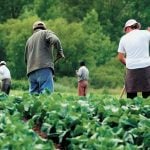OTTAWA – Encouraging developing countries to grow food for export is hurting their ability to feed their own people, says an observer.
Brian Tomlinson, policy analyst with the Canadian Council for International Co-operation, said trade is promoted as a way to boost economies, but it has skewed crop production in some countries.
“In some African countries the orientation of trade is almost exclusively to the production of export crops,” he said. “Rural people have no access to land and that’s diminishing their ability to produce food for themselves.”
Read Also

Alberta may eliminate marked fuel
Alberta may soon stop selling dyed gasoline and diesel.
Tomlinson said production of traditional crops, which have less value on the export market, is diminishing in favor of trade crops like wheat.
Men benefit more
Women are particularly losing out, he said, because they are the ones involved in food production for their families.
Men are more involved in the trading of commodities and get more revenue.
Tomlinson said dumping subsidized food is also a problem.
One chapter in the recently released The Reality of Aid, 1997-98, an independent annual review of development co-operation, outlined how subsidized European beef was dumped into South Africa, undermining the efforts of local beef producers.
The report estimates that South African farmers have suffered a 40 percent reduction in income.
“This has led to losses to the economy estimated to be equivalent to 95 percent of the European Union’s annual aid to South Africa,” said a backgrounder on the report.














